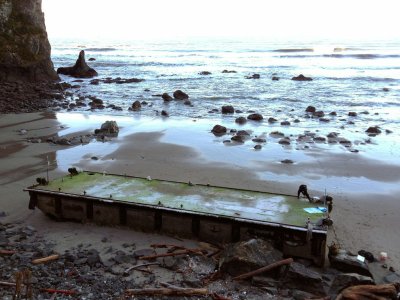Green studying tsunami's impact on coastline debris
Approximately 6,700 miles away from Misawa, Japan, one of the Port of Misawa’s 65-foot long docks is battering the Washington coast.
Rebekah Green, associate director of the Resilience Institute at Western’s Huxley College of the Environment, and two of her students are trying to determine what else beach visitors might expect to see washed up on the shore.
The March 2011 earthquake in Japan caused a tsunami to rush miles inland from the Japanese coast. The water washed away boats, cars, homes and docks similar to the one battering the coastline of Olympic National Park, thousands of miles away. Green says that currents were able to push some of the lighter debris across the Pacific Ocean and this debris is starting to show up along the coasts of Washington and British Columbia.
Green and one undergraduate from both the Bellingham and Port Angeles campuses received a $6,723 grant from Jefferson County to research and organize data from past beach cleanups, and track the change in debris since the tsunami from two years ago.
The students will be using data compiled by Washington CoastSavers, a volunteer organization that helps clean up the coast. The students will then categorize this data to create a baseline to check if more debris than usual is being washed up.
“Coastal cleanup is usually done by volunteers,” Green said. “They really aren’t prepared for more debris than usual.”
Green is anticipating a spike in the amount of debris, but she is not sure for how long, or how big the debris will be.
The data will help with questions of policy such as wondering whose responsibility it is to clean the coast, and who will foot the bill to do so, Green said.
The completed research will most likely be shared with the Washington State Department of Ecology, organizations such as CoastSavers and other interested nonprofits.
Go online to track the latest news about tsunami debris.
